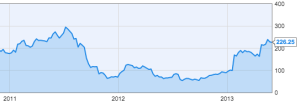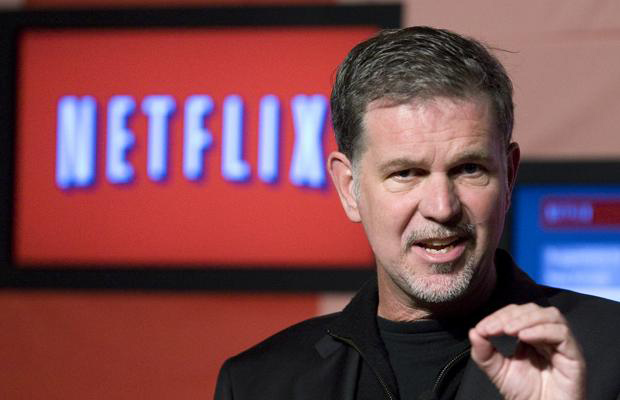It has only been a few days since the release of Arrested Development on Netflix, but the fourth season of the series has already exceeded the company’s expectations. In an interview at the D11 conference, CEO Reed Hastings and Chief Content Officer Ted Sarandos talked about the company’s plans for more original programming, as well as its relationship to other content providers and distributors.
Arrested Development, of course, has been popular on Netflix for years. It’s been one of the all-time top-rented DVD programs and highly viewed streaming options, thanks to a rabid — and growing — fan base over the years. It was that existing viewership that gave Netflix confidence that a new season of the show could be a hit on the service.
While it’s still early, Hastings said that the reaction to the show has been great. “We had high expectations for Arrested Development, but so far it’s exceeded them,” he said. But Arrested Development is just one part of a new programming slate that has Netflix on the road to becoming a serious player in original content.
Onward and Upward With Originals
 Part of Netflix’s success in recent years has come from making the transition from “rerun TV” — showing syndicated TV shows and second-run movies — to a place where users can discover new programming they can’t see anywhere else. That move started with the launch of Netflix’s first streaming original, the mob fish-out-of-water story “Lillyhammer.”
Part of Netflix’s success in recent years has come from making the transition from “rerun TV” — showing syndicated TV shows and second-run movies — to a place where users can discover new programming they can’t see anywhere else. That move started with the launch of Netflix’s first streaming original, the mob fish-out-of-water story “Lillyhammer.”
But its original programming has been picking up steam, with the launch of Kevin Spacey-led political drama House of Cards, as well as the Eli Roth horror series Hemlock Grove. And, of course, Arrested Development.
Next up is Weeds creator’s Jenji Kohan series “Orange Is The New Black,” which is based on Piper Kerman’s memoir of spending a year in minimum-security prison. Netflix also has licensed a sci-fi series being created by the Wachowski Brothers, the guys behind the Matrix trilogy, and a kid-focused series called Turbo in conjunction with Dreamworks. In addition to those new shows, Netflix will start to stream second seasons of Lillyhammer and House of Cards as it seeks new original programming.
According to Sarandos, the company has deliberately sought out a variety of programming for streaming, seeking to appeal to a wide and varied audience. “Our subscribers have very diverse tastes, so want to touch on each of them,” Sarandos said.
It’s no coincidence as well that the shows it has picked have so far done well with international audiences. Only about 35 percent of the dialogue in Lillyhammer is in English, for instance, and it has done well in Netflix’s recently launched Nordic region. House of Cards has a U.K. pedigree, as it was based on a miniseries about British politics. And Hemlock Grove, while filmed in English, has done well in Latin American markets, where the horror genre is more popular on TV, Sarandos said.
Licensing the content users want
On that front, Netflix has earned more power in its ability to negotiate deals with content owners. The company’s licensing fees have become an important part of studios’ P&L sheets, and as a result, Netflix has gained a little bit of leverage in its licensing talks. But Hastings said that the goal is to continue having a good partnership with content owners in which both sides benefit.
“I don’t think about this as a zero-sum game,” Hastings said. “We’re growing the market so that they have incremental revenue and we have incremental subscribers.”
That said, the company has become more discerning about what content it’s willing to pay for — and at what cost. At the same time that Arrested Development was coming online, Netflix was seeing some of its most popular kids content disappear. Shows from Viacom-owned cable network Nickelodeon have recently been taken off the online streaming service, after a few years of being available to subscribers.
While it’s true that Nick content — like Dora the Explorer and Spongebob Squarepants — is gone, the company has added other children’s programming, like Jake and the Never Land Pirates from Disney and Cartoon Network’s Adventure Time. The reality is that Netflix isn’t going to have everything, Sarandos said.
The ability to discern the value of content based on its popularity and the value that it provides in growing Netflix’s subscriber count has increased over time, and as a result the company is being more picky about how it spends its licensing dollars. That’s changed its relationship with some of the major content creators it works with.
When it just started out licensing content for its streaming service, the studios and networks had a tremendous amount of bundling power, Sarandos said. In a hunt for titles, Netflix ended up licensing large amounts of content. But as time has gone on, the company has decided it’s better to pay a premium for individual series that it wants to have on the service, rather than spending on a bundle of shows that had lower viewership.
Don’t Call It A Comeback
 Netflix, of course, has been on a tremendous comeback, after stumbling during its plans to separate its DVD and streaming businesses. In the process, it raised the price of the combined service by about 60 percent, and it announced a new company, called Qwikster, which it eventually walked away from.
Netflix, of course, has been on a tremendous comeback, after stumbling during its plans to separate its DVD and streaming businesses. In the process, it raised the price of the combined service by about 60 percent, and it announced a new company, called Qwikster, which it eventually walked away from.
Since that initiative, Netflix has seen a gradual decline in DVD users, but that’s been more than offset by an increase in the number of domestic streaming subscribers. The company now has about 30 million subscribers in the U.S. and another 7 million in international markets.
“Streaming has grown steadily for seven years. Our membership count has grown every quarter but one,” he said. “If you look at the business, every quarter we’ve been growing, but the stock price has gone up and down, up and down.”
The stock market has also responded. After Qwikster, the stock fell precipitously — from a high of nearly $300 a share to a low of $53 last summer. And yet, it’s been on a remarkable rise since then, as Netflix’s earnings and subscriber numbers have defied expectations. After hitting a 52-week high near $250, the stock has settled in at around $225 per share.
Hastings attributed the volatility to a misunderstanding in business any time a company like Netflix does anything new. He said that the market was skeptical when it moved from DVD-by-mail to streaming, but the company has tremendous faith that’s where the overall market is going.
“Most consumers want on-demand video, and what the Internet has to offer. We have confidence that in five to 10 years, it will all be Internet TV, and these apps will be on all kinds of devices,” Hastings said.
While Netflix considers itself just another network that will operate in that all-IP ecosystem, it doesn’t have any plans to be distributed in the traditional pay TV structure. It’s committed instead to marketing directly to subscribers in the U.S. and international markets.
“We’re really focused on the straight-to-consumer market,” Hastings said. That will include expanding to new countries, as well as expanding the amount of original content that is available to its subscribers.
